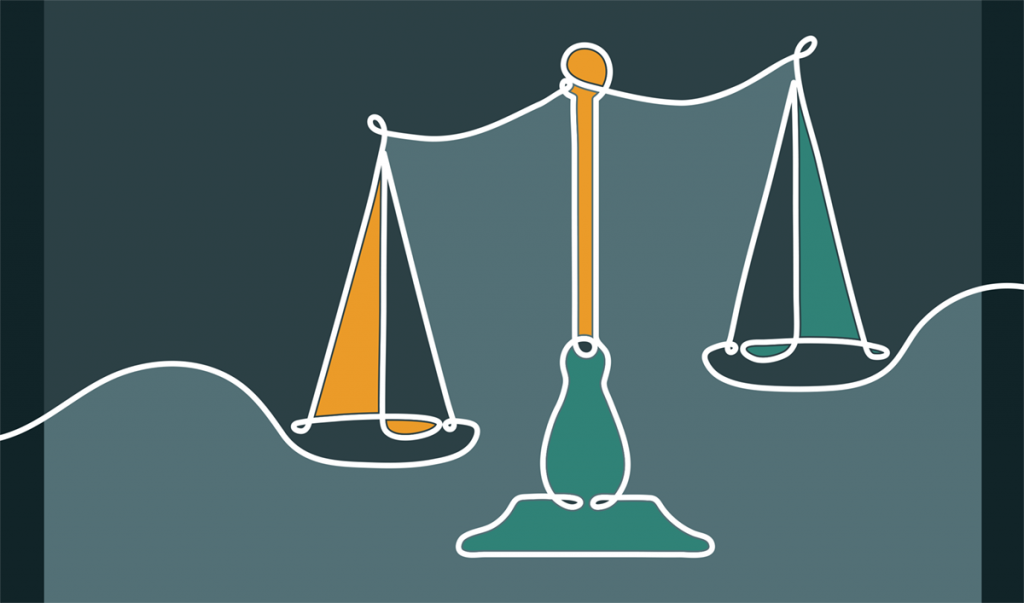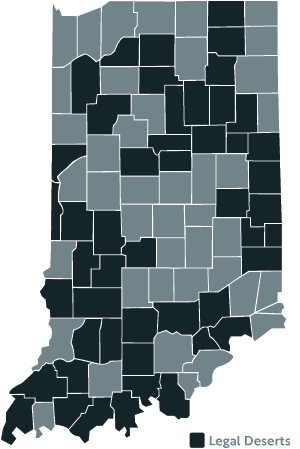By Robert Rath, Chief Innovation Officer | Indiana Office of Judicial Administration, Office of Innovation


Indiana faces an attorney shortage statewide, and 49 of 92 counties are considered legal deserts—areas of the state suffering most from the shortage. The Commission on Indiana’s Legal Future was created to bridge this gap. An issue nationwide, the burden of the attorney shortage falls most heavily on residents in rural communities and on individual consumers in need of legal services, advice, or information.
Only licensed attorneys can provide legal services or advice in Indiana. The commission offered recommendations to expand the attorney pipeline, but those changes alone cannot meet the needs of consumers. In its July 2024 interim report, the commission also proposed a regulatory reform program. The Supreme Court directed the Innovation Committee to draft the initial parameters of such a program—with a proposal due March 1, 2025—and to evaluate two additional reforms: allied legal professionals and a new model nonprofit law firm.
Regulatory reform pilot program
The Innovation Committee researched efforts in other states to change the regulation of the attorney profession and held a one-day brainstorm to consider redesign options. In its report to the Supreme Court, the committee proposed a structure to evaluate pilot programs suggested by courts, nonprofits, educational institutions, judges, lawyers, or other individuals with ideas to relieve the attorney shortage. The Office of Judicial Administration will triage the suggestions and submit them to the Innovation Committee. Proposals may be assigned for further analysis to a subcommittee, a Judicial Conference committee, or to an OJA agency for further action.
Allied legal professionals

The committee outlined parameters for a sample pilot program for allied legal professionals. ALPs can be authorized to provide legal advice or representation in specific practice areas and under certain circumstances, such as practicing in legal deserts. A growing number of states have modified their regulations to qualify individuals to provide limited legal services without requiring them to be licensed attorneys.
The pilot program would not address alternative business structures or the commercial practice of law. Instead, the committee and OJA will target their limited regulatory resources to relieve the harm caused by the legal desert. The committee will focus on regulatory pilot projects in the following types of entities:
- Civil legal aid and pro bono providers
- Nonprofit law firms that provide legal services in rural counties or counties that are classified as legal deserts
- Nonprofit community-based organizations that provide legal services in furtherance of their core mission
- Government agencies and offices
ALPs in these entities must be managed by attorneys responsible for each ALP’s conduct under Professional Conduct Rule 5.3. Nonprofit entities that employ ALPs must carry adequate professional liability insurance that covers the ALPs.
The model would evolve through a series of pilot programs designed to train, certify, and employ ALPs. Educational partners may propose programs to develop ALPs across a variety of practice areas. The Office of Admissions and Continuing Education would establish a registry of ALPs with appropriate continuing education requirements. Nonprofit law firms, community based organizations, and government entities may propose programs to hire and utilize ALPs to further their mission.
Nonprofit law firm

The court directed the Innovation Committee to evaluate a third suggestion: to develop parameters for a pilot grant for non-traditional law firm models to serve clients of “modest means” through a self-sustaining operation. The new firm would charge fees on a sliding scale, based on ability to pay, and would leverage technology and resources to focus on high-volume, low-complexity matters where many litigants are self-represented today. The firm would employ allied legal professionals with attorney supervision to assist clients who typically cannot afford to hire an attorney. The firm will serve clients who can pay a lower fee for services, referring potential clients who qualify for civil legal aid to providers that receive funding from the Indiana Bar Foundation.
Other professions, including healthcare, have faced a similar struggle. There are not enough medical doctors for the patients seeking care, so regulations allow many other types of providers to fill the gap. From nursing assistants with high school diplomas to medical assistants with associate degrees to registered nurses with bachelor’s degrees to nurse practitioners with graduate degrees, over 90% of healthcare service providers offer care without an MD or DO degree. Medical providers complete the necessary training and education, and some positions may have additional certification requirements, but healthcare would fall apart without these positions.
The Innovation Committee is a permanent committee under Administrative Rule 4, tasked with fostering an environment conducive to experimentation. The committee’s mission includes launching pilot projects designed to test new procedures and assess their potential for scalability and broader application within the legal system. The committee was designed to be a testing ground for novel ideas, making it the ideal forum to implement the suggestions from the Commission on Indiana’s Legal Future to ease the burden caused by legal deserts.